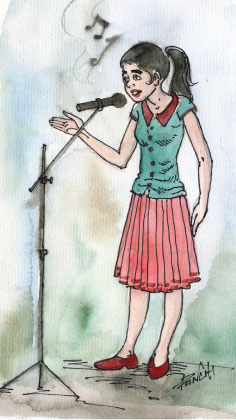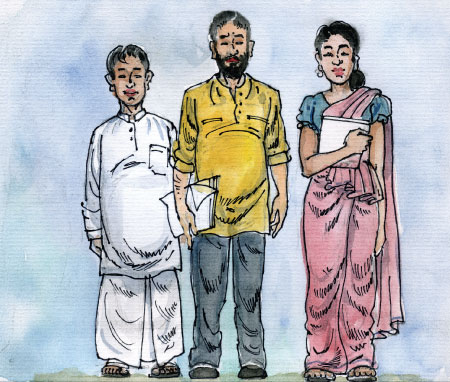|

by R. S. Karunaratne
The use of superlatives
After superlatives, we normally use “in” before the names of places.
Pidurutalagala is the highest mountain in Sri Lanka.
 |
|
Amanda is the best singer in the choir. |
Everest is the highest mountain in the world.
The Nile is the longest river in the world.
Albert Einstein was the most prominent physicist in the world.
Sirius is the brightest star in the sky.
After superlatives, we use “in” before singular words for groups of
people.
Sangakkara is the best player in the cricket team.
He was the youngest minister in the Cabinet.
Amanda is the best singer in the choir.
Sam is the tallest teacher in the staff.
He was the shortest actor in the cast.
In certain instances, we use “of” after superlatives.
Nicholas is the brightest of the three brothers.
February is the shortest month of the year.
June 21 is the longest day of the year.
The Mercedes is the most expensive of the three cars used by the
minister.
Sanduni is the prettiest of the five actresses.
Adverbs
Sentences with superlative adverbs are not very common in English.
Activity
Make sentences with superlatives using the following words and check
your answers with the key.
1. in the 1970s / the Beatles / rich / musicians/ world
...............................................
2. in my job /Thursday / busy / day / week
...............................................
3. John / that / says / Rex / good / singer
.........................................
4. my / brother / tall / man / our / city
..........................................
5. Sri Lanka / in / December / cold / month / year
...........................................
6. old / who / three / your / sisters / ?
............................................
7. Helen / beautiful / woman / Troy
.............................................
8. William / boy / intelligent / my / class
.............................................
9. To Kill a Mocking Bird / good / novel / published / recent / times
 |
|
Sam is the tallest teacher
in the staff. |
..............................................
10. is / London / city / big / England
...............................................
Key:
1. In the 1970s, Beatles were the richest musicians in the world.
2. In my job, Thursday is the busiest day of the week.
3. John says that Rex is the best singer in the choir.
4. My brother is the tallest man in the city.
5. In Sri Lanka, December is the coldest month of the year.
6. Who is the oldest of your three sisters?
7. Helen was the most beautiful woman in Troy.
8. William is the most intelligent boy in my class.
9. To Kill a Mocking Bird is the best novel published in recent times.
10. London is the biggest city in Britain.
Match words and meanings
Here’s an exciting way to enrich your vocabulary. Match the words in
column “A” with their meanings in column “B” and check your answers with
the key. The first has been done for you.
[Column A]
P 1. dissolute
... 2. dissolution
... 3. dissonance
... 4. dissuade
... 5. distance
... 6. distant
... 7. distaste
... 8. distend
... 9. distinct
.. 10. distinction
.. 11. distinctive
.. 12. distinguish
.. 13. distinguished
.. 14. distort
.. 15. distract
.. 16. distracted
.. 17. distraught
.. 18. distress
.. 19. distressed
.. 20. disturb
.. 21. disuse
.. 22. disyllabic
.. 23. ditty
.. 24. diva
.. 25. divan
[Column B]
A. to persuade someone not to do something
B. a difference between two similar things
C. to notice the difference between two things
D. to change something from its original condition
E. nervous or worried
F. upset or worried
G. the condition of not being used
H. a short simple song
I. a very successful and famous female singer
J. having two syllables
K. a dislike of something which you find unpleasant
L. to interrupt what someone is doing
M. a sofa with no back or arms
N. a feeling of extreme worry
O. the amount of space between two places
P. immoral
Q. a combination of sounds not pleasant when heard together
R. to swell and become large
S. respected and admired
T. extremely worried
U. far away
V. to make someone stop giving their attention to something
W. something that is easy to recognise
X. clearly noticeable
Y. the act of ending an official organisation
Y. too large or too small in comparison to something else
Key:
2. Y 3. Q 4. A 5. O 6. U 7. K 8. R 9. X 10. B 11. W 12. C 13. S 14. D
15. V 16. E 17. T 18. N 19. F 20. L 21. G 22. J. 23. H 24. I 25. M
Starters:
How to use ‘quite’ and ‘rather’
‘Quite’ means a little or a lot but not completely.
I am quite happy but I need a little more comforts.
 |
|
The Taj Mahal is quite amazing to look at. |
I got late because there was quite a lot of traffic today.
Detonating bombs is quite a risky job.
I feel quite hungry now.
The lecture was quite interesting.
I am quite surprised at your results.
As an adverb quite ‘means completely.’
The two problems are quite different.
Are you quite sure of your results?
The bride and the bridegroom almost match but not quite.
I enjoyed his new film but it's not quite as good as the earlier one.
Quite frankly, I don't like this job.
Your prediction is quite wrong.
His ambition to be a pilot is quite absurd.
In certain African countries the political situation is quite hopeless.
She was quite alone when I went to the library.
The Taj Mahal is quite amazing to look at.
Sam is quite a brilliant student in my class.
Are you quite certain that he has passed away?
The rumour is quite false.
The murder of three children in the same family is quite horrible.
Grandfather found it quite impossible to climb the mountain.
You are quite right.
It's quite true that the director has resigned.
Some of the books printed in Sri Lanka are quite useless.
Not quite
We use ‘not quite’ to express that we are not certain about something.
I don't quite know what to do.
I didn't quite understand what you said.
Stress with ‘quite’
When we stress ‘quite’, it means “fairly but not very.”
Your short story is quite good, but I've read better ones.
She's quite pretty, but there are more beautiful girls in the class.
Try to get up quite early, but not at 1 a.m.
Rather
As an adverb, ‘rather’ means “to a slight degree.”
It's rather hot today, isn't it?
For some students logic is rather a difficult subject.
Somebody answered the telephone rather sleepily.
‘Rather’ can mean ‘more exactly.’
She is my brother's friend really, rather than mine.
In unfavourable comments, we usually use ‘rather.’
His lecture is rather boring.
In favourable comments, ‘rather’ means ‘to a surprising or unusual
degree.’
It's rather warm today. (It's usually not so warm)
He is rather good at mathematics.
Quiz on idioms
An idiom is a special kind of phrase. It is a group of words which
have a different meaning when used together from the one it would have
if the meaning of each word were taken individually. Tick the meaning of
the following idioms and check your answers with the key.
1. If something pays dividends...
(a) it bring advantages at a later date
(b) it brings no advantages
(c) it brings no tangible results
2. If something is just what the doctor ordered...
(a) it is extremely dangerous
(b) it is extremely pleasant or useful
(c) it is very unpleasant
3. If someone dies like a dog...
(a) They die bravely
(b) They die happily
(c) They die in a painful and undignified way
4. If someone has a dog-in-the-manger attitude...
(a) They prevent other people from using or enjoying something that they
cannot use or enjoy themselves
(b) They help other people to use and enjoy something
(c) They encourage others to enjoy themselves
5. If an event is a dog's breakfast...
(a) it is organised in a hurry
(b) it is well organised
(c) It is badly organised
6. Every dog has its day...
(a) everybody will get what they desire
(b) every dog will live happily one day
(c) everyone will be successful at sometime in their life
7. If you are in the doghouse...
(a) people are annoyed with you because of something you have done
(b) people are pleased with you because of something you have done
(c) people are afraid of you
8. If you ask someone to call off the dogs...
(a) you are asking them to obey you.
(b) you are asking them to be friendly with you
(c) you are asking them to stop attacking you
9. If a country is going to the dogs...
(a) it is becoming less powerful or efficient
(b) it is progressing
(c) it is developing slowly
10. Let sleeping dogs lie...
(a) do not interfere with a situation causing trouble
(b) do not provoke sleeping dogs
(c) do not encourage people to fight among themselves
Key:
1.(a) 2. (b) 3. (c) 4. (a) 5. (c) 6. (c) 7. (a) 8. (c) 9. (a) 10. (a) |

